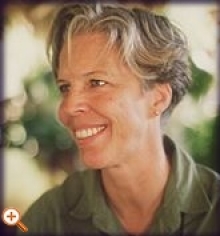Director: BRASS/El Pilar Program
MesoAmerican Research Center
University of California, Santa Barbara
Dr. Anabel Ford has decoded the ancient Maya landscape by combining archaeological research with traditional Maya knowledge. Ford distinguished herself in Mesoamerican archaeology with the study of patterns of settlement and environment, demystifying traditional views of the ancient Maya by examining the common human aspects of this civilization that shed light on sustainable farming practices. This forms the foundation for her current inquiries.
Ford is recognized for her discovery of the ancient Maya city center of El Pilar, on the contemporary border of Belize and Guatemala, which she has transformed into a living museum and laboratory. El Pilar has become a familiar and innovative archaeological site practicing "Archaeology Under the Canopy" -- using the landscape as a tool of conservation. Monuments covered with sweet moss and draped with Ramon trees make a striking and unique Maya experience. El Pilar is a model of synergy between nature and culture and is where Ford's focus on cultural ecology- the multifaceted relationships of humans and their environment—is being applied to benefit of contemporary populations. The co-evolution of human societies and the environment bring particular relevance to the study of Maya prehistory.
At El Pilar, Ford is advancing programs that simulate "Maya Forest Gardens" as an alternative to conventional monocrop farming. Using anthropology as a springboard for interdisciplinary research, she proposes ancient traditions yield contemporary solutions for the Maya forest of Belize, Guatemala, and Mexico.
Dr. Ford has partnered with Exploring Solutions Past ~ Maya Forest Alliance and a team of Maya forest gardeners, all members of the El Pilar Maya Forest Garden Network (EPFGN), in the small village of Sta. Familia, Belize, to create the model forest garden, called Känan K'aax at Sta. Familia Primary School. This collaboration has the support of a grant from the National Geographic Society Conservation Trust. Ford has supported the implementation of a working educational garden for the school students. Känan K'aax sets the groundwork for a community teaching site that can grow as a local, regional, and international resource on traditional Maya practices that provide essential clues to how the ancient Maya civilization thrived.
Dr. Ford's work transcends the archeological realm, entering the world of argroecology, environmental anthropology, and economic botany. Her innovative work offers an innovative approach to conservation that is imperative to the survival of the Maya living history.

